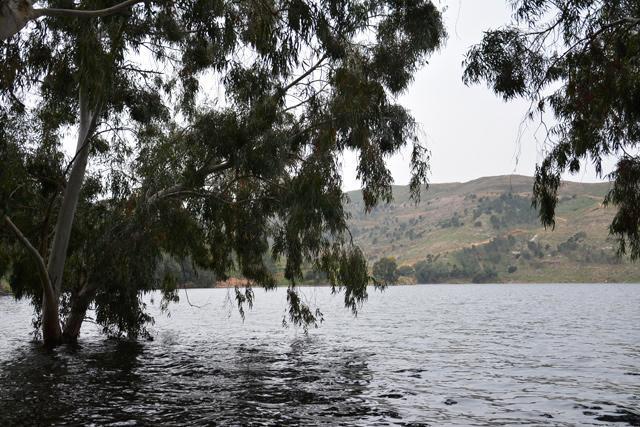You are here
RSS, UNDP sign agreement to expand water management in northern Jordan
By Batool Ghaith - Apr 04,2022 - Last updated at Apr 04,2022
AMMAN — The Royal Scientific Society (RSS) and the United Nations Development Programme (UNDP) signed a cooperation agreement to implement a project to expand innovation in water management for climate security in northern Jordan, according to an RSS statement.
The RSS noted that the project, which began in September 2021, will for 12 months be implemented in Mafraq and Jerash.
“The overall objective of this project is to enhance climate security among Syrian refugees and host communities by valorising local water innovations and supporting entrepreneurs and SMEs to pilot and scale-up their innovative solutions among local communities,” Rana Ardah, manager of the Water Studies Division said.
This will “build an expandable model that can be replicated and scaled up for longer-term sustainable development”, Ardah added in an email interview with The Jordan Times.
Ardah indicated that the movement of refugees to Jordan has reached “critical levels”, and thus calls for targeted responses to deal with the related humanitarian needs.
“With 83 per cent of refugees in Jordan living outside of camps, social coherence between refugees and their host communities is critical to maintain stability and security while providing opportunities and services to both refugees and their Jordanian host communities,” she added.
Mafraq and Jerash are examples of host communities in Jordan that suffer from water resource scarcity and unemployment, and host large refugee populations, Ardah mentioned.
“The selected regions of Jerash and Mafraq are also subject to severe risks of droughts as per the Sendai Framework for Disaster Risk Reduction 2015 – 2030,” she said.
The gravest environmental challenge that Jordan faces today is water scarcity, as the annual per capita share of water in Jordan was estimated at around 46 cubic metres in 2017, much lower than the level of the global water poverty line of 500 m3 per year, Director of the Water Environment & Climate Change Centre at the RSS Almoayied Assayed said.
“Whereas the country’s population continues to rise, water resources have fluctuated around a stationary average transforming a comfortable balance between demand and available water supplies in the last two decades into a chronic and worsening imbalance,” Assayed told The Jordan Times in an email interview.
According to Assayed, the current demand already exceeds renewable supplies.
Jordan loses up to half of its water to non-revenue water — water lost through leaky pipes, theft, and under-billing, Assayed noted.
These pressures are exacerbated by the observed and projected adverse impacts of climate change. The Initial, Second and Third National Communications to the United Nations Framework Convention to Climate Change (UNFCCC) foresee that over the next three decades, Jordan will witness a rise in temperatures and a drop in rainfall, resulting in reduced water availability, Assayed explained.
“This will impact all sectors, especially water and agriculture, in achieving water and food security,” Assayed said.
He noted that the project will create additional job opportunities within the targeted communities in Mafraq and Jerash. The project will build the capacities of 20 entrepreneurs/SMEs and support them to scale up their water technologies in the targeted local communities.
According to Assayed, the RSS is now looking to integrate digital tools into water management, such as satellite images, IoT and big data algorithms.
UNDP is also exploring, with partners, the possibility of scaling up the project’s interventions to other governorates.
“During this year, UNDP Jordan jointly with FAO, the ministries of Environment, Agriculture and Water and Irrigation will begin the implementation of building resilience to cope with climate change in Jordan by improving water use efficiency in the agriculture sector through the BRCCJ project,” Nedal Al Ouran, head of the environment, climate change and DRR Portfolio at UNDP, told The Jordan Times in an email interview.
The BRCCJ project will be implemented in four governorates in the Dead Sea Basin, in the areas most vulnerable to climate change — Madaba, Karak, Tafileh and Maan, according to Ouran.
Ouran noted that the goal of the project is to build the adaptive capacity of communities and institutions, address the needs of vulnerable groups, and increase the resilience of water management systems as well as the agricultural sector to climate change.
“Identifying tailored climate security solutions is vital to respond to communities and rural areas’ needs,” he added.
Related Articles
AMMAN — The Royal Scientific Society (RSS) and the United Nations Development Programme (UNDP) on Monday signed a cooperation agreement to i
AMMAN — The Jordanian start-ups that participated in the “Scaling up Water Innovation for Climate Security” project installed 18 water manag
AMMAN — The Royal Scientific Society (RSS) on Thursday signed agreements with seven Jordanian start-ups with "pioneering" models in water an














